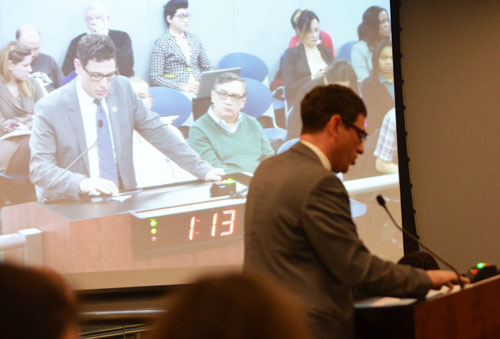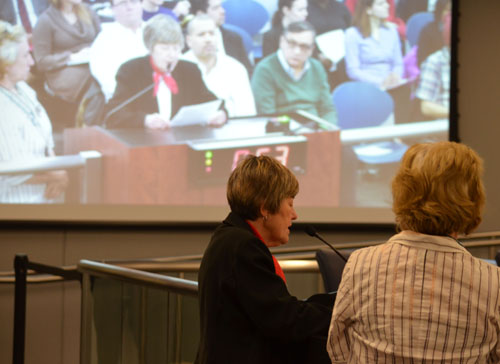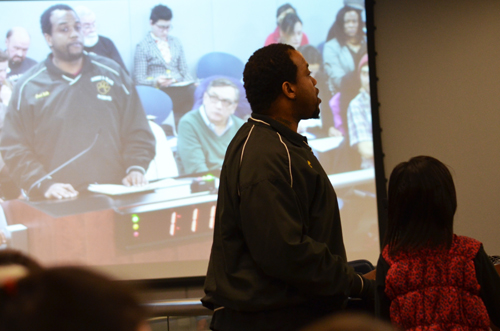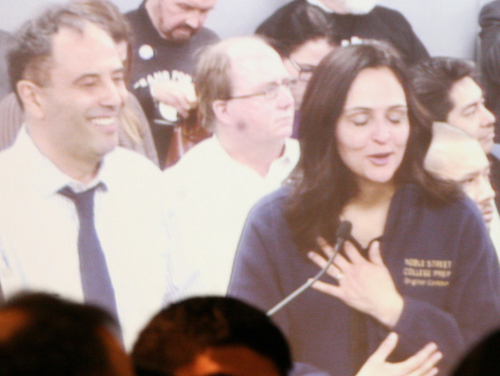BOARDWATCH: Chicago Board of Education meeting of February 25, 2015 continued the Board's privatization and charter school policies despite the verdicts of the February 24 municipal election against Rahm Emanuel and the massive vote for an elected school board!
The Chicago Board of Education met on February 25, 2015, the day after the vast majority of voters in Chicago voted that it should not exist in the form it has taken for more than a century: The Board is appointed by the mayor; the vote on February 24 was nine to one in favor of an elected school board. The meeting of Wednesday, February was convened at 42 West Madison Street, the old Sears Loop Store, at the so called "Garden Level", which now houses the small Board Meeting Room. The cramped design was deliberately done by the current leadership of the nation's third largest school system to discourage members of the public and the press.  Chicago Teachers Union Vice President Jesse Sharkey asked the Board of Education to continue to resist the imposition of the PARCC tests on all CPS schools. He also reminded the Board members, all of whom are appointed by Mayor Rahm Emanuel, that the day before the Board meeting, citizens of Chicago in 37 wards had voted by a nine to one margin that the city should have an elected school board. Substance photo by George N. Schmidt.The meeting lasted only one-and-a-half hours because there were so few people signed up to speak, so the meeting ended shortly before noon. Public Participation participants spoke after a brief report on the budget by Chief Education Officer, Barbara Byrd-Bennett.
Chicago Teachers Union Vice President Jesse Sharkey asked the Board of Education to continue to resist the imposition of the PARCC tests on all CPS schools. He also reminded the Board members, all of whom are appointed by Mayor Rahm Emanuel, that the day before the Board meeting, citizens of Chicago in 37 wards had voted by a nine to one margin that the city should have an elected school board. Substance photo by George N. Schmidt.The meeting lasted only one-and-a-half hours because there were so few people signed up to speak, so the meeting ended shortly before noon. Public Participation participants spoke after a brief report on the budget by Chief Education Officer, Barbara Byrd-Bennett.
Roll call indicated that only five of the seven Board members were present: Dr. Henry Bienen, Board Vice-President Jesse Ruiz, Andrea Zopp, and Dr. Carlos Azcoitia. Absent were Dr. Mahalia Hines and Deborah Quazzo. Also present were Board President David Vitale, Board Counsel James Bebley, and Chief Executive Officer (CEO) Barbara Byrd-Bennett.
During the "good news" portion of the meeting, Michael Milkie, chief of the "Noble Network of Charter Schools" and Noble charter school alumni were honored. None of the Board members mentioned the fact that the Noble Street charter schools were founded by Milkie after he left teaching at Wells High School and that Milkie has traditionally sent the students who don't follow his "standards" back to the city's real public high schools.
The business portion of the meeting began. The public agenda was 190 pages long, but most of the items were, as usual, not discussed by the Board members or staff. Chief Executive Officer Barbara Byrd-Bennett, like the Board members appointed by Rahm Emanuel, gave an update on the FY16 budget. In regard to cuts to the budget, she stated that more were expected. In the past, she said, the Board tapped into one-time dollars and now all short-term solutions have been exhausted. "Springfield is now our only solution," she said. She added that Illinois was second to last of all states in education funding. In regard to pension costs, she said that Illinois is the only state in which pension costs are paid by the state.
Board members were asked if they had any questions, but did not at this point.
Byrd Bennett continued by reporting on the five-year action plan. According to her latest version of the plan, it includes "partners for health issues", restorative justice, and substance abuse interventions. She also talked about "School Climate Standards" under which 72 schools will have leadership teams and new climate standards. In addition, 15 high school principals will share best practices with each other. She said we have come so far in the last three years and yet much more needs to be done. She concluded that there are no limits to the possibilities students can achieve.
Dr. Carlos Azcoitia, a Board member, asked a question related to the big proponent of academic and emotional development. Then Board President David Vitale announced that members of the public can meet with Board members by calling 773-553-1600.
Board Secretary Estela Beltran announced the date of the next Board meeting, March 25, 2015. She said that members of the public who wish to give public testimony can call to reserve a space starting at 8 a.m. March 10 and continue till 5 p.m. on March 20 -- or until all 60 slots are filled, whichever comes first.
The Board continues to restrict the number of those giving public testimony to 60, no matter how many issues might come up or how many people might wish to speak about their public schools. Once again, the public was put in its place. Two minutes for speakers, no matter how many people needed to speak or what the issues. The Board Secretary, Estela Beltran, then reminded the public of the time-keeping system at the podium for two-minute testimonies. On the podium
was a light that was green for one minute and 30 seconds when someone began to
speak, then the light turned yellow to indicate 30 seconds were left, and finally the light turned red when time was up. Vitale said that the Board was trying to come up with plans to meet at other locations than the downtown "central offices."
 School nurses Helen Ramirez Odell and Joan Lipschutz told the Board that the privation of nursing services in Chicago's massive school system had decimated school health services and endangered children's health. The Board members sat stolidly and voted, later in the meeting, to continue the privatization of the services, despite the growing dangers. Substance photo by George N. Schmidt.First to speak in "public participation" at about 11 a.m. was Helen Ramirez-Odell, a retired school nurse. She spoke of the greater needs of special education students for nursing services. She said that nursing vacancies are being left unfilled, while noting that privatization is not working for school health services. She said the movement of the schools to privatization was a major concern. She addressed measles and immunization requirements. She noted that nurses assigned to too many schools have only one day or half a day in a school. She added, "Privates agencies are in the business to make money." She ended by saying that Chicago Public Schools can solve the problem by hiring more real nurses for the city's real public schools.
School nurses Helen Ramirez Odell and Joan Lipschutz told the Board that the privation of nursing services in Chicago's massive school system had decimated school health services and endangered children's health. The Board members sat stolidly and voted, later in the meeting, to continue the privatization of the services, despite the growing dangers. Substance photo by George N. Schmidt.First to speak in "public participation" at about 11 a.m. was Helen Ramirez-Odell, a retired school nurse. She spoke of the greater needs of special education students for nursing services. She said that nursing vacancies are being left unfilled, while noting that privatization is not working for school health services. She said the movement of the schools to privatization was a major concern. She addressed measles and immunization requirements. She noted that nurses assigned to too many schools have only one day or half a day in a school. She added, "Privates agencies are in the business to make money." She ended by saying that Chicago Public Schools can solve the problem by hiring more real nurses for the city's real public schools.
Next, Joan Lipschultz, a school nurse, who said she took a personal business day to attend, said that certified school nurses are needed. She added that the private agencies take weeks and weeks to deal with situations when asked. She stated that there are 25 percent fewer nurses than 25 years ago and echoed Helen Ramirez Odell: "We need to hire more nurses."
After the nurses concluded, Amber Mandley, of Chicago International Charter Schools (CICS), rose to praise the charter schools. She told the Board the she had researched CPS schools and alternative schools before sending her son to school. She said she was impressed with CICS and that her son was now in fifth grade. She spoke animatedly about her son's enthusiastic interest in
the periodic tabl of elements (as if the city's real public schools didn't teacher science) that was being taught. She added that she had to go out and buy a poster of the Periodic Table for him.
Next was a speaker from John Dore Elementary School. Corrie Archie spoke of over-crowding and the need for a building addition so that special education students could remain at Dore past fourth grade. She said that her son is autistic and has been at Dore from first grade until fourth grade, and that the school had become a major factor in her son's improvements. She stated that change would be hard and disruptive for him. She added that Dore is closer to her home than the school he would have to transfer to for fifth to eighth grades.
After she spoke, three persons from Jose deDiego Community Academy spoke. John Engels spoke of school issues, such as safety and security, a disciplinarian who was not hired as expected, and
children who experience no consequences for their inappropriate actions. He mentioned a sixth grade student who posted a picture on Facebook and threatened to kill a teacher, but who suffered no consequences for these actions.
Juan Madrigal told of a student who brought many bullets to school in the student's backpack and gave three to another student. The teacher discovered this, but the police were not informed. She noted that misbehaviors were not disciplined according to the Student Code of Conduct and emphasized the refusal of the administration to discipline students even for criminal offenses. She said that six veteran staff members have left the school -- one who was a 20-year veteran. She also said that some who left were diverse-learning teachers and that as a result the students were not getting the services to which they are legally entitled. She emphasized that students were not getting the services that they were legally and morally entitled to. She added that caseloads have jumped by more than a dozen and that special education teachers are also used as subs.
President Vitale spoke to CEO Byrd-Bennett who directed a staff member to meet here with the persons from Dore.
Next to speak was Arny Stieber, speaking for Veterans for Peace. Stieber told the Board that he is a veteran of the the imperialist war against the people of Viet Nam. He spoke of the "military model" being applied to schools across the United States, and especially in Chicago. He said, "When good people are trained to do bad things, they will do bad things." He said that the military model requires that orders be followed without question and that the CPS is the most militarized in the nation. He added that he was working to educate others on the reality of the military model.
After Stieber spoke,, EvAngel YHWHnewBN spoke. Once again, she told everyone that what she calls "the K word" (kids) should be kicked out of educators' vocabulary because, she claims, a child is not a kid, which is an animal. She than said there was a need for an executive order
for Jackie Robinson West Little League players to get $10,000 scholarships per student. She said that the members of the Korean Little League team, which defeated Jackie Robinson West for the world title, each received a $100,000 scholarship.
President Vitale directed a staff member to help her.
Then Tina Barrett informed everyone of what was going on at "Sarah E. Goode STEM Academy."
She said that there were two principals since the school opened and other staff changes as well. She said the school has a full-time police officer, that there are not enough books or teachers and that no Local School Council (LSC) election was held in April. She added that money was being pumped into administering the school, but not for teachers.
After she spoke, Ronald Jackson, said that Rahm Emanuel did not get 50 percent of the vote for Mayor of Chicago. He added that with a run-off, the people will have the opportunity to get rid of David Vitale, etc. He noted that we need nurses for students with special needs. He also said that a report had not been put out about the fifty schools that were closed. He emphasized that we had not gotten savings from the closings and the Board was not being transparent. He spoke of the occurrences of murder and rape in the schools in which the Board had done nothing. He also claimed racism was being practiced.
 Andre Kelley, an LSC member at Black school, spoke after student Tacora Moore (right above) decried the overcrowding at Black and noted that CPS has been promising to add an annex to the school since Paul Vallas was Chief Executive Officer (Vallas's time ended in June 2001). The Board members had no answer to the dramatic presentations by the Black school team. Substance photo by George N. Schmidt.Another overcrowding problem came next. Tacora Moore, a student spoke of the conditions at her school, Black Magnet Elementary School. She said the school was too crowded and conditions were not good.
Andre Kelley, an LSC member at Black school, spoke after student Tacora Moore (right above) decried the overcrowding at Black and noted that CPS has been promising to add an annex to the school since Paul Vallas was Chief Executive Officer (Vallas's time ended in June 2001). The Board members had no answer to the dramatic presentations by the Black school team. Substance photo by George N. Schmidt.Another overcrowding problem came next. Tacora Moore, a student spoke of the conditions at her school, Black Magnet Elementary School. She said the school was too crowded and conditions were not good.
Another speaker from Black Elementary was Andre Kelley, an LSC member. He said that Black was a Level One school but was overcrowded, with one student bathroom for 270 students. He mentioned a girl who was cut by contact with the radiator in the bathroom. He spoke of flooding in the administrative offices. He concluded that Black was a "patch" school where patches were put on problems. He said that all the way back in 2003, an addition was needed.
A speaker from Ebinger Elementary School in Edison Park was next. Timothy Heneghan, a parent and a member of the LSC expressed the need for an annex because of overcrowded classrooms. He said that Ebinger provided a top-notch education and was the best kept secret on the North Side. He spoke of the present student enrollment of 594 students increasing to 742 by 2016 and 892 by 2020.
Next, Latrice Foules of SPOILED (Single Parents of Illinois Empowered) in the Altgeld Community read a mission statement asking for a reduction in substance abuse, the empowerment of youth leaders and a drug-free community. Also from SPOILED, Demoine Diminguez said that 21% of high school students use drugs for the first time and 22% have used drugs for the first time over the last 30 days. She said that 24% use cigarettes. She added that prescriptions drugs were also used and that drugs were being bought and sold on school property.
Deborah Butler-Bourne from DePriest said she wants to retain her position at DePriest. She spoke of an alternative form of discipline, false residency charges regarding a child, and repeated that she wants to continue at DePriest.
Jennifer Biggs of Raise Your Hand (RYH) spoke of concerns about the the Partnership for Assessment of Readiness for College and Careers (PARCC) test and the Illinois State Board of Education (ISBE). She stated that the Board had said that 10% of students were supposed to be tested, yet everyone is expected to be tested. She wanted to know - what is going on? She asked the Board to make a statement. She said the situation looks like politics.
After she spoke, Jesse Sharkey, Chicago Teachers Union (CTU) Vice-President, said he had not yet spoke on the elected school board. He said it was "like speaking about Thanksgiving to your vegan cousin." He noted that 37 wards got to vote on the elected school board and almost 90% voted yes, 9-1. He also said that it was eight days to the PARCC testing and that test prep was being done, but is the test being given? He added that ISBE was squeezing and we need to know what's going on.
Finally, Kathleen Acosta and Kyra Parnell delivered the usual praises about charter schools. Kathleen Acosta of EPIC Academy Charter High School on the South East Side said she has one learning disabled child, Mary Rose, who is now in all regular education classes and has been accepted as a nursing student at Western Illinois University, the first in her immigrant family to go to college.
Kyra Parnell, of the Noble Network, said she had applied to 12 colleges and had been accepted at the University of Iowa and others.
Questions from Board members followed public participation.
 Despite the massive rebuke suffered by the Chicago Board of Education in the February 24 referendum for an elected school board, the Board members on February 25 continued their public support for the city's corrupt charter schools. Prior to the Board meeting, the Board honored Michael Milkie (above left) and the "Noble Network of Charter Schools." This was despite the fact that the practice of "dumping" students by Noble has been reported and exposed for years, demonstrating how the fraudulent claims of statistical success were made. Substance photo by David Vance.Andrea Zopp wanted an update on the nursing program and said that the overcrowding issues raised in regard to Robert Black School need to be addressed. President Vitale added that Dore and Ebinger need to be addressed also.
Despite the massive rebuke suffered by the Chicago Board of Education in the February 24 referendum for an elected school board, the Board members on February 25 continued their public support for the city's corrupt charter schools. Prior to the Board meeting, the Board honored Michael Milkie (above left) and the "Noble Network of Charter Schools." This was despite the fact that the practice of "dumping" students by Noble has been reported and exposed for years, demonstrating how the fraudulent claims of statistical success were made. Substance photo by David Vance.Andrea Zopp wanted an update on the nursing program and said that the overcrowding issues raised in regard to Robert Black School need to be addressed. President Vitale added that Dore and Ebinger need to be addressed also.
Continuing the Board's promotion of the charter schools, Henry Bienen asked the last speaker to tell what other universities she had been admitted to.
President Vitale told CTU Vice-President Sharkey that we need to be aware of the consequences of not doing the PARCC test and said that "we are in-between a rock and a hard place."
Noting the story in the morning newspapers about the Board agenda, Carlos Azcoitia asked about the impact of borrowing and the long-term implications on the Board's debt load. Chief Administrative Officer (CAO) Tim Cawley took the microphone and said we should talk about financing and exchanging, not "swaps" and told the Board that the action proposed on the agenda was to give the Board a lower interest rate this way.
Dr. Azcoitia asked if this meant no credit rating decrease. Cawley replied no credit rating decrease, but he said he was "grim on the operating budget." He said the rating may be re-evaluated but not because of this action.
Then Dr. Bienen made a motion that the Board go into closed session. The security staff ordered everyone to leave the Board Chambers, even though there are not enough seats outside for all those from the public and the media who wanted to wait until the Board returned to vote on its published agenda. The Board's reports will be available on line in video form, with some editing, by March 3rd or 4th. The Board also published its "Action Agenda" indicating which Board Reports were approved from the meeting.

